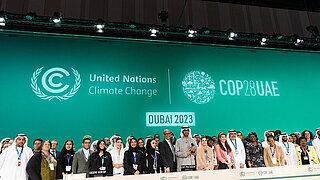COP28: Advancing Global Climate Action

The 28th Conference of the Parties (COP28) was held in Dubai, United Arab Emirates (UAE), from 30 November to 12 December. The conference attracted some 85,000 participants from 198 countries, underlining its role as the key platform for global climate discussions under the auspices of the United Nations Framework Convention on Climate Change.
Historically, these conferences have been instrumental in forging critical climate agreements, such as the Kyoto Protocol at COP3 in Kyoto, Japan (1997), the Paris Agreement at COP21 in Paris, France (2015), the Glasgow Climate Pact at COP26 in Glasgow, Scotland (2021), and the establishment of the Loss and Damage Fund at COP27 in Sharm El Sheikh, Egypt (2022).
At COP28, important targets were set:
- Phasing out fossil fuels and coal
- Renewables and energy efficiency as key technologies
- Adaptation
- Climate justice
- Loss and Damage Fund
- Aligning Nationally Determined Contributions (NDCs)
Phasing out fossil fuels and coal
COP28 marked a significant milestone with its strong stance on fossil fuels. The agreement signed at COP28 aims to end the fossil fuel era by 2050. This includes commitments from 167 countries to phase out coal by the 2030s. As such, this agreement reflects a global recognition of the need for a sustainable energy transition and underlines the understanding that investments in fossil fuels are increasingly unsustainable in the pursuit of global climate goals.
Renewables and Energy Efficiency as Key Technologies
Renewable energy and energy efficiency were at the heart of the COP28 agenda. Countries agreed to increase global commitments to triple renewable energy and double energy efficiency by 2030. This focus on renewables as key mitigation technologies is critical to reducing emissions and moving towards a low-carbon future.
Adaptation
The conference also prioritised adaptation, setting specific targets for water management, health, agriculture and the development of early warning systems. This collaborative approach will ensure that all countries are equipped with the necessary tools and strategies for resilience.
Climate justice
COP28 recognises that developing countries have special needs, while also being located in the regions of the world most affected by climate change. A socially just energy transition must include methods for these countries to develop and access industrial markets while meeting international climate goals.
Loss and Damage Fund
Solidarity was further demonstrated through contributions to the Loss and Damage Fund, with Germany and the United Arab Emirates announcing an initial commitment of US$100 million. The Fund, which now stands at $792 million, is a concrete expression of support for the nations most affected by climate-related disasters.
Aligning Nationally Determined Contributions (NDCs)
COP28 also called on all parties to align their Nationally Determined Contributions (NDCs) with the ambitious goal of limiting global warming to 1.5 degrees Celsius, covering emissions across the economy. This Directive reaffirms the collective commitment to achieving the goals set out in the Paris Agreement.
German Ministers Advocate for Renewable Energy Transition
Reflecting on the outcomes of the conference, German Foreign Minister Annalena Baerbock emphasised that the transition away from fossil fuels is crucial to promoting security, justice and a sustainable economy. Noting the continued commitment to climate justice, she said: "We are walking the path of climate justice together, hand in hand with our partners around the world".
Dr Robert Habeck, Germany's Federal Minister for Economic Affairs, welcomed the emphasis on renewables, saying the expansion of wind and solar energy by 2030 was "a clear signal to companies, markets and investments that the energy of the future will be renewable and used efficiently".
COP28 set a new standard for climate action with its comprehensive approach to phasing out fossil fuels, strengthening adaptation, promoting climate justice and demonstrating solidarity through financial support. These efforts underline the global resolve to tackle the climate crisis and provide a pathway to a sustainable and just future for all.
Contributions of the Energy Partnerships
COP28 not only provided a space for international climate negotiations and target setting, but the climate and energy partnerships were also able to contribute to the global discussions. For example, the Qatari non-profit organisation Al-Attiyah Foundation approached the energy partnership to include experts from the BMWK in a panel discussion on voluntary carbon markets (VCMs). VCMs are becoming increasingly important in the Gulf region as several countries explore carbon pricing mechanisms to accelerate decarbonisation.
The conference also provided an opportunity for a discussion between the UAE and Germany on the future of carbon pricing in Europe and the Middle East, enabling green hydrogen certification and providing information on the impact of the EU's Carbon Border Adjustment Mechanism. In addition, a joint study on the potential of wind energy in the United Arab Emirates, carried out by Guidehouse in collaboration with the UAE Ministry of Energy and Infrastructure, was launched at COP28. The study shows suitable onshore wind conditions in the south-western desert region of the UAE, while offshore wind conditions are less favourable.
The Israeli-German Energy Partnership also contributed with an event at the German Pavilion about the partnership, its achievements and the official signing of the work programme for 2024. UAL's Gerlind Heckmann was also invited as a panelist to talk about the potential of hydrogen in the MENA region.
Women Empowerment at COP28
The German Federal Ministry for Economic Affairs and Climate Action (BMWK) hosted among others the first official "Women Energize Women & Allies" event with opening remarks by State Secretary Stefan Wenzel in cooperation with the Global Women’s Network for the Energy Transition (GWNET) in the frame of BMWK‘s campaign Women Energize Women (WEW). WEW also participated as a partner in the COP28 - Dubai Dialogue organised by the Women in Renewables Alliance (WiRA), GWNET and Women in Renewable Energy (WiRE). At the Israeli pavilion, experts from the Israeli NGO Women in Energy also highlighted key energy policy issues. These events increased the visibility of women experts and improved networking opportunities.